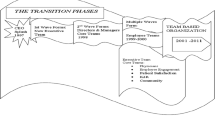Abstract
In the tumultuous and chaotic environment of managed health care, hospital-based mental health providers need to change in fundamental ways. The traditional view of mental health organizations is a professional-bureaucratic one where actions and outcomes of planning are thought to be highly predictable. The author proposes an alternative paradigm for viewing mental health provider organizations, one based on learning theory, which accepts that the future is unknowable because of its complexity and the probabilistic nature of the world. Within this perspective, mental health care providers need to become “learning organizations” to successfully adapt to the new and evolving conditions.
Similar content being viewed by others
REFERENCES
Advocates, citing study, see discrimination in lower mental health care spending. (1998, May 8). Boston Globe, p. A06.
Argyris, C. (1992). On organizational learning. Malden, MA: Blackwell.
Argyris, C., & Schon, D. (1978). Organizational learning: A theory of action perspective. Reading, MA: Addison-Wesley.
Austad, C.S. (1997). Is long-term psychotherapy unethical? Toward a social ethic in an era of managed care. San Francisco, CA: Jossey-Bass.
Barnsley, J., Lemieux-Charles, L., & Kinney, M. (1998). Integrating learning into integrated delivery systems. Health Care Management Review, 23(1), 18-28.
Bittker, T.E. (1985). The industrialization of American psychiatry. American Journal of Psychiatry, 142, 149-154.
Capra, F. (1982). The turning point: Science, society, and the rising culture. New York, NY: Bantam Doubleday.
Cohen, J., & Stewart, I. (1994). The collapse of chaos: Discovering simplicity in a complex world. New York, NY: Penguin.
Garvin, D.A. (1993). Building a learning organization. Harvard Business Review, 71(4), 78-91.
de Geus, A.P. (1988). Planning as learning. Harvard Business Review, 66(2), 70-74.
Ginter, P., Swayne, L., & Duncan, W. (1998). Strategic management of health care organizations (3'd ed.). Malden, MA: Blackwell.
Goldman, W., McCullock, J., & Strurm, R. (1998). Costs and use of mental health services before and after managed care. Health Affairs, 17(2), 40-52.
Goodman, M., Brown, J.A., & Deitz, P.M. (1996). Managing managed care II: a handbook for professionals. 2nd ed. Washington, DC: American Psychiatric Press.
Griffith, J. (1992). The well-managed community hospital (2nd ed.). Ann Arbor, MI: Health Administration Press.
Hay Group. (1998). Health care plan designs and cost trends: 1988 through 1997. Washington, DC: Author.
Janis, I. (1971, November). Groupthink. Psychology Today, pp. 271-279.
Kilborn, P.T. (1998, March 21). Managed care: Looking back at Jackson Hole. New York Times, p. B-4.
Kiel, L.D. (1994). Managing chaos and complexity in government: A new paradigm for managing change, innovation, and organizational renewal. San Francisco, CA: Jossey-Bass.
Leebov, W., & Ersoz, C.J. (1991). The health care manager's guide to continuous quality improvement. Chicago, IL: American Hospital Publishing, Inc.
Ma, C., & McGuire, T. (1998). Costs and incentives in a behavioral health carve-out. Health Affairs, 17(2), 53-69.
March, J.G. (1991). Exploration and exploitation in organizational learning. Organization Science, 2(1), 71-87.
McDaniel, R. (1998). Strategic leadership: A view from quantum and chaos theories. In W. Duncan, L. Swayne, & P. Ginter (Eds.), Handbook of health care management (pp. 339-367). Malden, MA: Blackwell.
Meyer, R.E., & Sotsky, S.M. (1995). Managed care and the role and training of psychiatrists. Health Affairs, 14(3), 65-77.
Mintzberg, H. (1994). The fall and rise of strategic planning. Harvard Business Review, 72(1), 107-114.
Mintzberg, H., & Quinn, J. (1988). The strategy process: Concepts, contexts and cases (3rd ed.). Englewood Cliffs, NJ: Prentice Hall.
Morgan, G. (1997). Images of organization. Thousand Oaks, CA. Sage Publications, Inc.
Peters, T., Waterman, R., & Peters, T. (1988). In search of excellence: Lessons from America's best-run companies. New York, NY: Warner Books.
Redding J.C., & Catalanello, R.C. (1994). Strategic readiness: The making of a learning organization. San Francisco, CA: Jossey-Bass.
Roberts, M.C., & Hurley, L.K. (1997). Managing managed care. New York, NY: Plenum Press.
Senge, P.M. (1990). The fifth discipline: The art and practice of the learning organization. New York, NY: Currency Doubleday.
Senge, P.M., Kleiner, A., Roberts, C., Ross, R.B., & Smith, B.J. (1994). The fifth discipline fieldbook. New York, NY: Currency Doubleday.
Smith, D.B., & Kaluzny, A.D. (1986). The white labyrinth: A guide to the health care system (2nd ed). Ann Arbor, MI: Health Administration Press.
Stacey, R.D. (1992). Managing the unknowable: Strategic boundaries between order and chaos in organizations. San Francisco, CA: Jossey-Bass.
Thietart, R.A., & Forgues, B. (1995). Chaos theory and organization. Organization Science, 6(1), 19-31.
Weick, K.E. (1995). Sensemaking in organizations. Thousand Oaks, CA: Sage Publications, Inc.
Weick, K.E. (1979). The social psychology of organizing (2nd ed.). New York: Random House.
Weick, K.E., & Roberts, K.H. (1993). Collective mind in organizations: Heedful interrelating on flight decks. Administrative Science Quarterly, 38, 357-381.
Author information
Authors and Affiliations
Rights and permissions
About this article
Cite this article
O'Sullivan, M.J. Adapting to Managed Care by Becoming a Learning Organization. Adm Policy Ment Health 26, 239–252 (1999). https://doi.org/10.1023/A:1022217909472
Issue Date:
DOI: https://doi.org/10.1023/A:1022217909472




